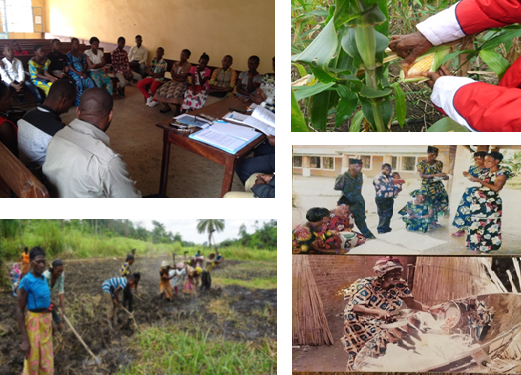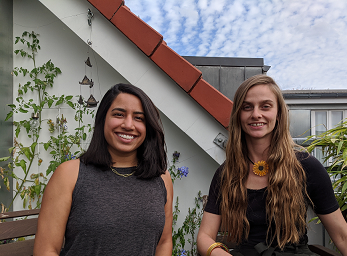
|
GenderCC Newsletter |
September 2020Dear readers,
The Covid-19 pandemic has been exposing and exacerbating many existing social inequalities all over the world. Regardless of where we are situated, the coronavirus pandemic has changed all of our lives. Yet depending on factors such as gender, social class, sexuality and race, the impact might have differed enormously. That is why GenderCC calls for recognising and addressing the gendered consequences of the pandemic with an intersectional approach.It is of utmost importance to continue our fight against climate change and its gendered implications in terms of impacts and responses. A look at the (very similar) effects of the coronavirus and climate crises on gender relations shows that they are based on structural inequalities and discrimination. Life and survival, along with the maintenance of daily life in both crises, are only secured by the already heavily burdened paid and unpaid care work in hospitals, nursing homes, and private households. We expand on the link between the coronavirus pandemic, climate change and gender in a joint discussion paper with genanet and LIFE, which you can access in English and German here.
This edition contains exciting news and updates from our members, among them a workshop on ‘Gender and the Environment` in Uvira, the Democratic Republic of Congo, talks on gender perspectives on climate discourses with a specific reference to Covid-19 and sustainable energy initiatives, and a call for applications for the international competition "The climate change at our doorstep".
We are also happy to share a webinar by Fridays for Future, who invited GenderCC board member Gotelind Alber to talk about feminism and climate justice. She explicitly addresses the question of why the climate crisis is not gender neutral and why gender must be integrated into climate policies in order to create truly sustainable climate justice, available in German.
We hope you enjoy this issue!
Kind regards,
The GenderCC Secretariat team |
Content
Activities of the Gender and Climate Change Community
News on Gender and Climate Change
|
News from GenderCC |
Not without us! Climate justice and gender justice in international climate politicsThe Not Without Us! project started its 4th year of implementing collective sharing of experiences and advocacy on gender and climate justice activism. With climate conferences postponed to next year, the project team’s plans for 2020 are to keep building each other’s knowledge on the issues we are working on locally through virtual learning sessions, and disseminate the materials and stories we have produced so far through a Medium page and audio features we will launch later this year. Keep an eye on our social media to stay updated! On August 4th, our team based in Berlin, Germany, promoted an open-air movie screening evening at the Rosengarten cafe, where we showed parts of the documentaries our team produced last year. Thanks to everyone who attended and the Rosa Luxemburg Foundation for their support! |
Gender Into Urban Climate Change InitiativeThe impacts of Covid-19 are differently felt and responded to in the countries and cities in which the GUCCI project is implemented. While we understand the necessity of government-mandated safety measures to ensure that the pandemic does not exacerbate the vulnerability of those already experiencing the severe impacts of climate change, our team has been working on ways to continue project activities safely and keep participant morale high. We recognise that isolation measures have been connected to a rise in care work activities and domestic violence, and that the pandemic has been affecting the work of our partners, led mainly by women and gender organisations as they cannot hold in-person meetings. Nevertheless, our team has successfully been able to continue the hard work. A series of online trainings on the topics of the project, videos and a booklet on the GAMMA methodology are among the highlights of what we have been working on over the last few months. Below are some examples of these activities: With our partners All India Women's Conference, Equidad de Género, ciudadanía, trabajo y familia, GenderCC Southern Africa - Women For Climate Justice, Aksi! – For gender, social and ecological justice and Solidaritas Perempuan, we produced an introductory video on our joint project. It is going to be featured during the UNFCCC Virtual Market Place, as part of the activities mandated under the Gender Action Plan.
During the strict lockdown in India due to Covid-19, our project partners from Kolkata launched an online competition calling for entries on creative writing, videos or illustrations featuring the gender dimensions of Covid-19 in the country. You can watch the video of the results of the competition here.
Last but not least, our partner Kalyani Raj from AIWC Delhi participated in the UNFCCC Asia Pacific Regional workshop on how to integrate gender into national climate action on July 22nd, where she spoke about the GUCCI project. |
Gender @ UNFCCC |
|
With the postponement of this year’s climate conferences due to the Covid-19 pandemic, in-person opportunities to meet, organise and advance urgent climate commitments were severely impacted. However, we and many other climate justice groups across the globe continued to work on demanding just responses to the intertwined crises we are facing. You can read some of our reflections on how the delay posed by the pandemic affects the climate negotiations and our movements in the article “Keeping the Momentum Going. With climate diplomacy on hold, how will movements respond?” by the Rosa Luxemburg Foundation. To keep the momentum going, the Women and Gender Constituency (WGC) co-organised the 3-day event “Momentum, Action & Justice: Cross-Climate Constituencies Virtual Town Hall” with allied constituencies to discuss and propose actions on how to move from analysis to ensuring implementation on climate action that lays the basis for a just recovery.
At the UNFCCC level, from 1 to 10 June, the June Momentum for Climate Change series of online events took place, as an attempt to keep the dialogue going as was planned in Bonn, Germany. One of the events was the global launch of the enhanced Gender Action Plan (GAP), which introduced the GAP planned activities for this year, including the regional workshops on gender integration into national climate actions (see dates and links to register below).
• Asia & the Pacific, 22 July at 7 am CEST / 12 pm UTC+7 >> Recording here
|
Activities of the Gender and Climate Change Community |
"Gender and the Environment" workshop in the DRCCrispin Swedi Bilombele, a GenderCC member from ANFD (Aube Nouvelle pour la Femme et le Développement, non-profit NGO), organised a workshop on ‘’Gender and the Environment’ in Uvira, in the Democratic Republic of Congo, on February 16-18th. The workshop included 20 participants: 8 young girls, 5 women representatives of NGOs, and 7 men. ‘’We promoted environmental sustainability by exchanging information and best practices on the reduction of climate change impact, and analysed the causes of economic and social inequality. We conceived strategies to adapt to the specific needs of men, women, boys and girls, and how the most vulnerable actors can strengthen the resilience of their living environments in order to reduce possible suffering from natural disasters. This includes those farming, collecting firewood and fetching water. More than 70% of the community depends on land for survival, and are often victims of environmental problems. These include declining soil fertility, water and energy resources, and loss of biodiversity, which in turn affects agricultural production and limit resources. The workshop improved the understanding of gender roles, including women’s participation in decision-making processes and access to income-generating activities in a context of changing social structures.’’ 
|
Gender and sustainable energy at the UN High Level Political ForumDuring the last INFORSE (International Network for Sustainable Energy) side event at United Nations High Level Political Forum (UN HLPF) on July 15th, our member Kalyani Raj spoke on 'Local climate & sustainable energy initiatives with gender perspective’. For an overview of the event click here. Ms. Raj furthermore spoke about ‘Gender integration in climate discourse with particular reference to Covid-19 and good practices' during a webinar by ICLEI India and CDKN on August 13th. |
Webinar on Feminism and Climate JusticeOn April 15th, Fridays for Future Germany invited our board member Gotelind Alber to talk about feminism and climate justice in a (German) webinar. |
Call for applications "The climate change at our doorstep"The association "elements. Bildung und Kultur in der Einen Welt e.V." is running the international competition "The climate change at our doorstep", which aims to identify the changes and consequences of climate change in our region and in our city. Contributions can be in German, English, Spanish or French. It is definitely worth participating; great prizes can be won: The 1st prize will be awarded in the amount of 500 euros, the 2nd prize in the amount of 200 euros and two 3rd prizes in the amount of 100 euros each. Contact info@climateproject.de or visit the website for more information. |
News on Gender and Climate Change |
How new is the Green New Deal for the Global South?The Green New Deal manifestos in the US and UK are among the most progressive proposals coming out of the industrialised world, but they remain flawed from the perspective of the colonised Global South, and fall short of the fundamental systemic shifts we need to save life on earth.
Read more here |
Climate Change and Gendered Vulnerabilities: Accounting for Women and Patriarchal Systems in Climate Governance PolicyThis article exposes how the patriarchal system aggravates climate change and why gender has to be included in climate policies to mitigate the climate crisis in the particular case of India.It states that the sociocultural context must be considered when developing climate justice strategies and that categories like gender and caste have to be taken into account by Indian climate policies if the government wants to successfully adapt and mitigate climate change.
Read the article here |
Supporting women environmental defenders in the time of COVID-19Protecting the environment and life on this planet cannot be limited to those who can afford to social distance, reflect, and mobilize. While possibilities for a different world are plentiful, the rollback on environmental and social protections is likely to rise as governments and corporations seek to extract their surplus, once again, from free (or cheap) nature, labour and reproductive labour. We know that dominant narratives, embedded in an environmentalism of the rich, can exacerbate inequalities. If the hopes for a different world are to stand a chance, researchers operating at the science-policy interface must ensure a firm commitment to advance social justice framings embedded in both environmentalism and feminism.
Read more here |
Who is Who at GenderCC |
Our new colleaguesDr. Aditi Surie von Czechowski will be supporting us as a project coordinator for the "Gender Into Urban Climate Change Initiative". Her areas of interest include: urban resilience, migration, climate finance and intersectional climate justice. She completed a PhD in Middle East, South Asian, and African studies at Columbia University, and previously worked at CDP.
Our new student assistant Vera Dickhoff is currently studying towards her Master’s degree in Interdisciplinary Latin American Studies at the Freie Universität in Berlin. Previously she studied Political Science and Law in Germany, Italy and Brazil. Her interests center around renewable energy policy, environmental peacebuilding and intersectional feminism. 
|
Publications |
How the COVID-19 fight could be a blueprint for successful Climate Change action by Kalyani RajFor decades now, climate change has been a hot-button issue, sparking raging debates between activists pushing for solutions and naysayers denying its very existence. Global conferences, policy motions and research studies are among the many endeavours undertaken to convey the dangers of climate change, raise public awareness and advocate mitigating measures. Yet, despite almost every person on earth witnessing some drastic change affected by climate change in their lifetime alone, there has never risen a unified global call to action. Perhaps this is because people associate climate change only with sudden but sporadic natural disasters, or believe that a single voice cannot make a difference to such a big cause.
Read the full article here
|
How to cope with the corona and climate crises in a gender-just way by genanet, GenderCC and LIFE e.V.This discussion paper is an attempt to highlight the connections between the coronavirus crisis and the climate crisis, and the responses in Germany. Together, they combine to aggravate another crisis that has already become apparent, at least in the nursing and education sectors: the crisis of care work. A look at the (very similar) effects of the coronavirus and climate crises on gender relations shows that they are based on structural inequalities and discrimination. It seems that life and survival, and the maintenance of daily life in both the corona and the climate crises are only secured by the fact that the resulting work is absorbed in an area that is already heavily burdened: the low-paid and unpaid care work in hospitals, nursing homes, homes for the elderly and private households. Many gender experts therefore worry about the long-term negative effects on gender relations and a retraditionalisation of gender roles.
|
Climate Change’s Disproportionate Impact on Women: Agricultural Workers in South Africa by Ndivile Mokoena and Mara DolanThe climate crisis is eroding the health and stability of ecosystems and livelihoods around the world. While the impacts of climate change are felt by all, they vary disproportionately based on various intersections of identity, including race, class, sexual orientation, and gender identity. Gender particularly remains a critical dimension in defining social structures and identities, and climate change exacerbates gender inequalities and discrimination. Because of their economic marginalization, political disenfranchisement, and differentiated labour responsibilities, women around the world face the consequences of the climate crisis first and worst, and women lack equitable representation and power in crafting climate policies to address their needs. Focusing on women in South Africa who work in the agricultural sector, this article will elucidate larger themes of gender inequality in agricultural workforces and this sector’s vulnerabilities to the climate crisis around the world.
Read the full article here. |
Gender awareness: towards a sustainable and just energy transition by Kathrin MeyerGender frameworks within energy efficiency efforts are key for the construction of a more sustainable future. In this three-part series, Kathrin Meyer explains the connection between energy and gender and why sustainable energy supply is not feasible without the use of gender-sensitive data.
Read the articles here. |
Gender in climate change, agriculture, and natural resource policies: insights from East Africa by Ampaire, E.L., Acosta, M., Huyer, S. et al.This study analyses the extent of gender integration in agricultural and natural resource policies in Uganda and Tanzania, and how gender is budgeted for in implementation plans at district and lower governance levels. Finding gender-responsive measures slowly improving but still inadequate, it proposes approaches that increase capacity to develop and execute gender-responsive policies, implementation plans, and budgets.
Read the full article here. |
UNEP Report: Gender, Climate & Security: Sustaining inclusive peace on the frontlines of climate changeThis UNEP report offers a comprehensive framework for understanding how gender, climate and security are linked (section II), and shares – through a series of brief case studies – practical examples of empirical research, analytical approaches, and programme interventions that can contribute to responding to these risks (section III). The report concludes (section IV) with a set of recommendations to guide policy-making, investments, programme design, and research, with the aim of catalyzing gender-responsive action on climate and security that ultimately contributes to inclusive and sustainable peace.
Read the full article here. |
Feminist geographies of climate change: Negotiating gender at climate talks by Miriam Gay-AntakiUsing qualitative methods, this paper delineates the mechanisms by which some meanings of gender like gender balance dominate over others like gender equality. It shows how discourses of gender and climate change arise, are perpetuated, and materialized through climate policy. Using an intersectional lens, it underscores the practices that perpetuate injustices, and explore the discourses that are the most popular at the COPs around gender and climate change, who perpetuates them, which narratives are mobilized, and which become invisible.
Read the full article here. |
|
GenderCC - Women for Climate Justice
Anklamerstr. 38 10115 Berlin Germany info(at)gendercc.net www.gendercc.net
If you would like to subscribe to the GenderCC newsletter please click here.
To unsubscribe, please click here. |